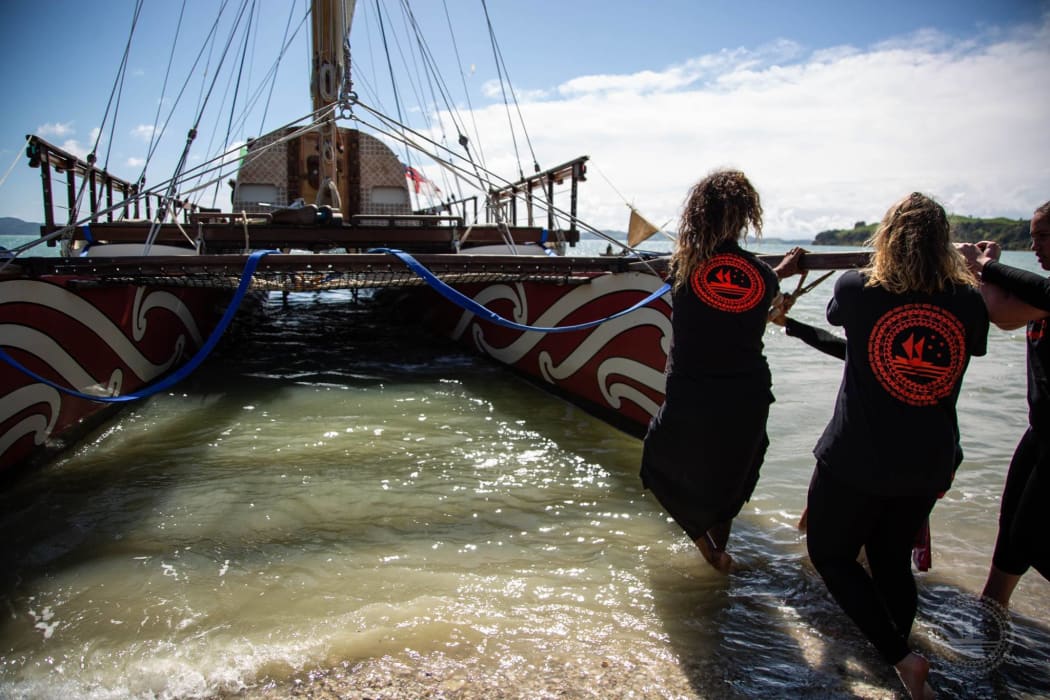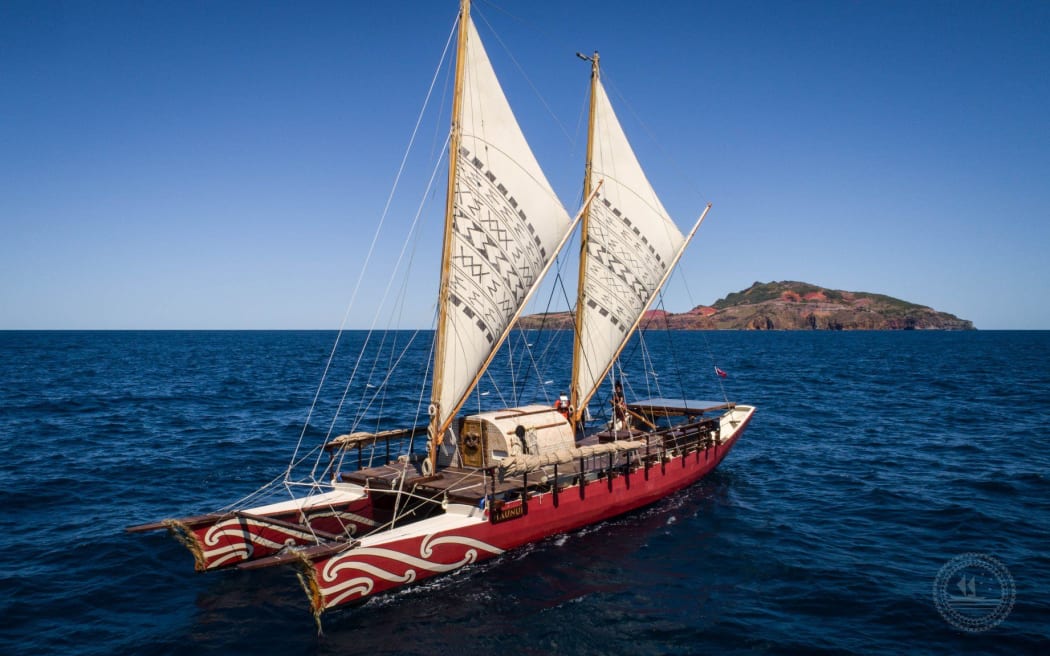A New Zealand ocean voyaging group is relieved to have its canoe - or waka hourua - back home, after an extended sail on the high seas due to bad weather.

Haunui returns to Aotearoa. Photo: Te Toki Waka Hourua / Facebook
The Haunui, a double-hulled voyaging waka, sailed to Norfolk Island in mid-September, with the crew expecting a brief stay before their return to New Zealand, but high swells and unfavourable winds kept sailors sick, and the vessel anchored in the lee of the island for almost three weeks.
Crew members managed the waka day and night while waiting for an opportune time to leave.
The Haunui is strictly powered by the wind, and guided by the stars - so there was no motoring back home. It took ten days to make the 500 nautical mile journey - twice as long as it took to get to Norfolk Island.
But one training navigator, Tiffany Laitame, said time was a premium when on the water.
"The first thing you have to learn is to maintain the waka... your time is really precious," she said.
Tiffany is from Rapa'iti in French Polynesia and said it was difficult at first to understand some of the captain's instructions.
"As a Tahitian I had to learn some of the Māori words, because sometimes the captain would say orders and some of the orders were in Māori, so you have to pick it up really quick."
Watch Alex Perrottet's full video report here:
And finally on a busy morning on Auckland harbour, among motorboats and yachts, the almost-still waters of the Hauraki Gulf were graced by the double-hulled voyaging canoe - a sight seemingly from a past age.
But that's exactly what this project is about.
By the 1970's the indigenous voyaging knowledge only remained alive within a handful of navigators in Micronesia. But bit by bit, and thanks to groups such as Te Toki Waka Hourua, the traditional Pacific ocean navigation is being revitalised and passed on.
Tiffany Laitame is in her thirties, and said she was perfectly placed to learn the skill from elders and pass it on to tamariki.
She said there's a number of different challenges on the waka, not least of all getting on with everybody in such close quarters.
"Sometimes there can be frictions, so we just get prepared before the voyage to be ready to live together," she said.
"So we know how these people react and we can work together as a family."

The Haunui, a double-hulled voyaging waka, out on the open waters. Photo: Facebook / Te Toki Waka Hourua
Before the window of good weather opened at Norfolk Island, the Haunui crew were treated to the islanders' hospitality and learnt of its rich culture.
So prior to raising its sails and heading off, several Norfolk Islanders were invited back to Aotearoa to return the favour.
That is, after ten gruelling days at sea.
Ivy Carr is an 18-year-old Norfolk Islander and very in touch with her own background.
"I'm an islander of Bounty mutineer descent, so I'm surprised they didn't repeat history," she joked.
But she said nothing she went through on the high seas could have prepared her for the whakatau she received on the shores of Maraetai and the pōwhiri at Umupuia Marae.
"That was something I will never forget in my life," she said.
"It was very emotional... it feels like home, really weird. The rolling hills behind, the cows, the whānau... it was very, very special."
Young Pacific Islanders like Ivy are the prime focus of Te Toki Waka Hourua, as well as young New Zealanders, who are learning the art of navigating by the stars, and understanding how Kupe and his people first travelled to Aotearoa.
Zaran Mackie, a 15-year-old from Whangarei, was part of a group that joined the waka in Northland, at Opua - the first stop to clear customs at Aotearoa after rounding Cape Reinga.
He says the three days on the ocean were better than being on land, and he is keen to learn more.
"For our people, without the waka, without our traditions, we wouldn't have been able to get to New Zealand, we wouldn't have been able to find our way here, so it's a very big part of who I am and who I'm going to become."
Zaran, who plans to join the army, said he appreciated the regime and routines on board.
"Discipline, there's a lot of discipline," he said.
"We do things like anchor-watch, and you're up long hours at night, watching the waka, sailing at night and you've got to have the discipline to make sure you can do it, to stay up and survive, I guess, the lack of sleep, and the lack of food sometimes."
Zaran said there's some basic tasks to do on the waka that many of his peers simply take for granted.
"Fishing... to fish for your food when there's no food left, self-maintaining, you know since we don't have a shower, you've got to wash up somehow so you jump in the water, go for a swim and use some soap - eco-friendly of course!"
Since being built in 2009, The Haunui has sailed to Pacific islands like Fiji, Vanuatu and the Solomon Islands, as well as further afield to Hawai'i and even to the Galapagos Islands and the West Coast of the United States and Mexico.
This voyage was skippered by John-Reid Willison and navigated with the assistance of kuia Liz Peyroux, known affectionately by the crew as 'Mama Liz'.
The visitors are staying at Umupuia Marae in Maraetai for a few days before flying back to Norfolk Island.


